
Small Intestinal Bacterial Overgrowth (SIBO) is a digestive disorder caused by an overgrowth of bacteria in the small intestine. This overgrowth can lead to various uncomfortable symptoms like bloating, distension, and abdominal pain. Knowing how to check for SIBO through specific test methods is essential to diagnose this condition early and effectively.
Nudge, a digestive health supplement company, offers a comprehensive solution to manage SIBO symptoms. Our flagship products combine powerful ingredients from the market and turn them into an all-natural pill, tackling the primary root causes of SIBO: gut motility issues, nutritional deficiencies, and stress. With years of industry experience, we offer Nudge SIBO Formulation supplement that supports digestive wellness and promotes long-term gut health.
In this blog, we will explore what SIBO is, its common symptoms, and how it affects your digestive health. By the end, you'll clearly understand different tests used on how to check for SIBO. You'll also learn the importance of early diagnosis in managing this condition and improving your overall well-being.
Let’s dive in!
What is SIBO?
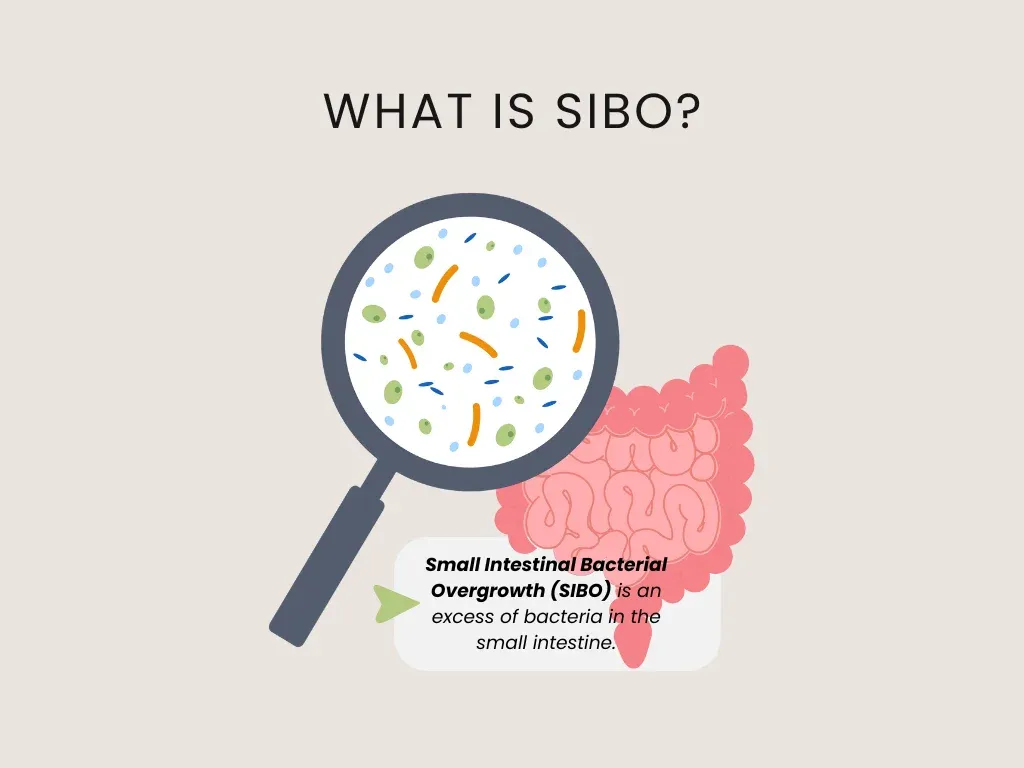
Small Intestinal Bacterial Overgrowth (SIBO) is an excess of bacteria in the small intestine. This overgrowth can lead to various digestive symptoms such as bloating, abdominal pain, diarrhea, and malabsorption of nutrients. Understanding how to check for SIBO for accurate diagnosis and management is crucial for effective treatment.
Early diagnosis and management of SIBO help prevent complications. Identifying SIBO as early as possible enables healthcare providers to administer specialized treatments such as antibiotics, probiotics, and dietary modifications. This paves the way to restore gut balance and reduce symptoms like bloating, diarrhea, and abdominal discomfort, enhancing the quality of life for individuals with SIBO.
Common Causes of SIBO
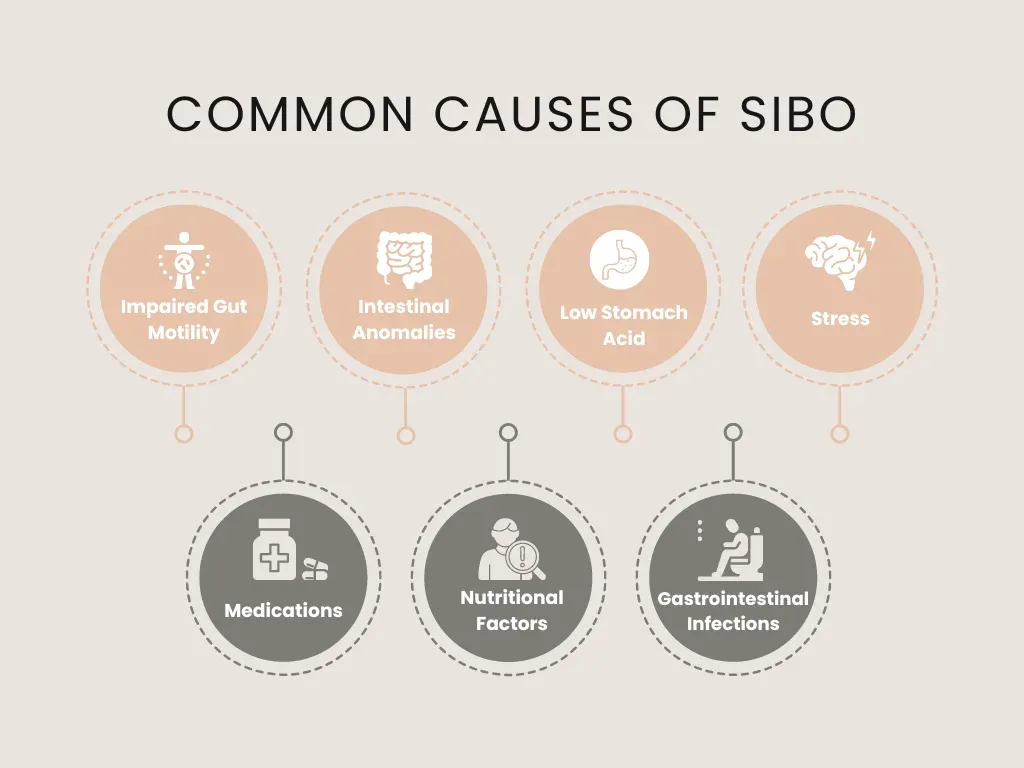
SIBO occurs due to various factors that disrupt the normal balance of bacteria in the small intestine. Understanding these factors describes how SIBO forms and affects digestion. Below, we'll uncover some of the primary reasons behind the occurrence of SIBO, providing insight into its development and impact on gastrointestinal health.
- Impaired Gut Motility: Impaired gut motility refers to disruptions in the normal movement of food through the digestive tract, which can lead to bacterial overgrowth in the small intestine.
- Abnormalities of the Anatomical Intestine: Intestinal abnormalities like strictures, diverticula, or surgical changes can trap food that causes SIBO.
- Low Stomach Acid: Reduced stomach acid level might prevent sterilization of ingested food, allowing bacteria to survive and triggering SIBO in the small bowel.
- Stress: Stress triggers gut inflammation, bloating, and uneasy digestion, which sometimes causes SIBO.
- Medications: Certain medications, such as proton pump inhibitors (PPIs), can reduce stomach acid production, which leads to changes in gut pH.
- Nutritional Factors: Diets high in refined carbohydrates, low in fiber, or lacking in certain nutrients can affect gut health and motility, potentially contributing to SIBO development.
- Gastrointestinal Infections: Previous infections or disturbances in the gut microbiota balance, such as post-infectious IBS, can disrupt normal gut function.
Signs and Symptoms of SIBO
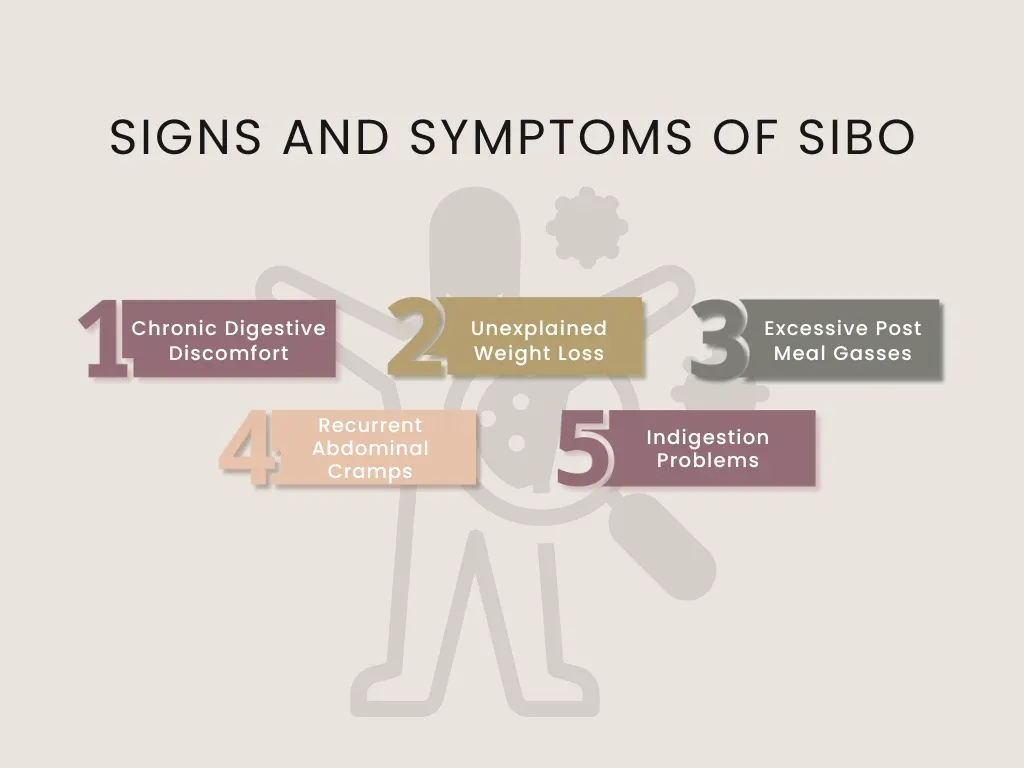
SIBO is often characterized by a range of distressing symptoms related to digestive health. These signs can significantly impact an individual's quality of life and may require further investigation. People who should know how to check for SIBO are those individuals who have experienced the following symptoms:
Chronic Digestive Discomfort
This symptom is commonly associated with irritable bowel syndrome (IBS), a persistent or chronic discomfort during digestion. This may include bloating, gasps, abdominal cramping, or feeling full after meals. People with this discomfort might also develop diarrhea, constipation, or bowel habits.
Altogether, these symptoms may interfere with daily life, such as decreased appetite, disturbed sleep, and discomfort. Such an interference is a major indicator of seeking medical evaluation, including SIBO testing.
Unexplained Weight Loss
Unexplained weight loss is a common but concerning symptom associated with SIBO. It occurs when an individual experiences a significant decrease in body weight without intentionally trying to lose weight through diet or exercise. This weight loss can result from malabsorption of nutrients due to bacterial overgrowth in the small intestine.
Excessive bacteria interfere with the body's ability to absorb essential vitamins, minerals, and calories from food. Individuals experiencing this symptom should promptly consult with healthcare professionals who know how to check for SIBO to conduct thorough evaluations and provide appropriate treatment plans.
Excessive Post Meal Gasses
These symptoms occur when the bacterial overgrowth in the small intestine ferments food, producing gasses like hydrogen and methane. After meals, this gas buildup can cause bloating, discomfort, and audible rumbling sounds in the abdomen. Individuals with SIBO may experience increased flatulence and belching due to the excessive gas production.
Treating SIBO with specific therapies can lessen gas production and relieve related symptoms. These therapies may include dietary modifications, antimicrobial agents, probiotics, and lifestyle changes to restore gut health.
Recurrent Abdominal Cramps
Recurrent abdominal cramps are usually associated with sharp or dull pain in the abdomen. These cramps can occur intermittently or persistently and may be triggered by meals or specific foods. The cramps often coincide with episodes of bloating and increased gas production, contributing to abdominal discomfort.
Addressing the underlying cause of SIBO through targeted treatments can help alleviate recurrent abdominal cramps. A healthcare professional who is an expert on how to check for SIBO should evaluate persistent or severe cramps for proper diagnosis and management.
Indigestion Problems
Indigestion problems are common symptoms associated with SIBO, often manifesting as discomfort or pain in the upper abdomen after eating. This discomfort can be accompanied by feelings of fullness, bloating, and nausea.
Indigestion in SIBO occurs due to abnormal food fermentation by excess bacteria in the small intestine, leading to gas production and pressure in the digestive tract. As a result, those experiencing SIBO may deal with acid reflux or heartburn due to gastric reflux and increased intra-abdominal pressure.
How to Check for SIBO
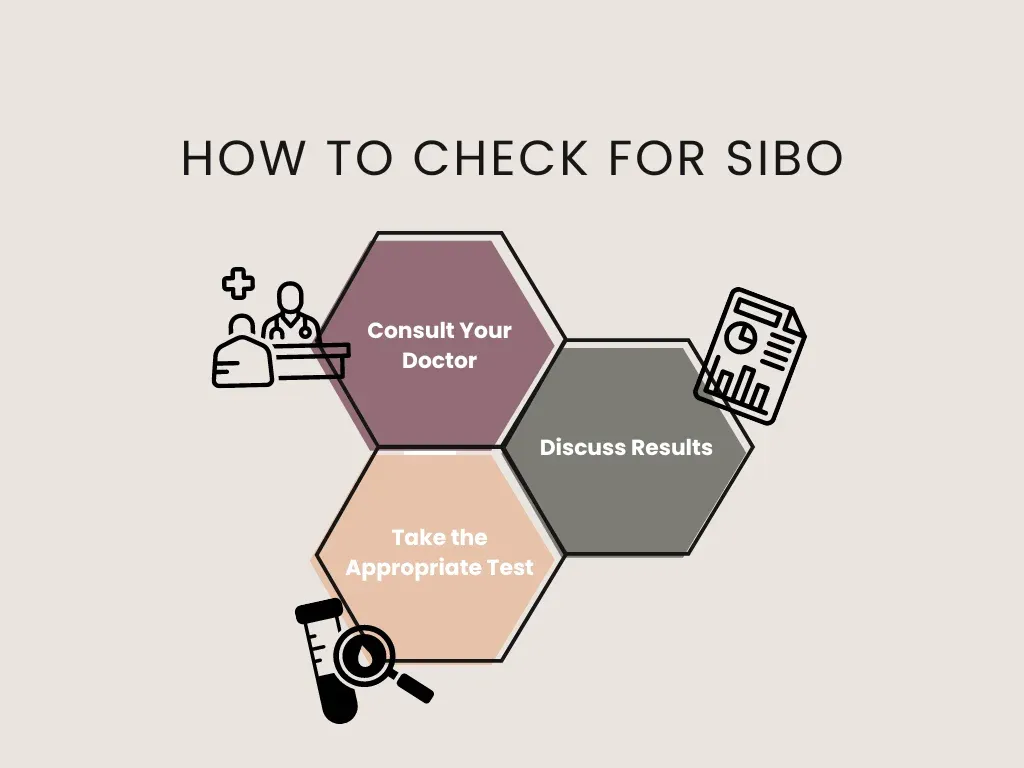
Checking for Small Intestinal Bacterial Overgrowth involves specific diagnostic tests to confirm its occurrence. These tests help healthcare providers identify bacterial overgrowth in the small intestine. Here are the steps on how to check for SIBO and what to expect during the diagnostic process.
Step 1: Talk to Your Doctor About Your Symptoms
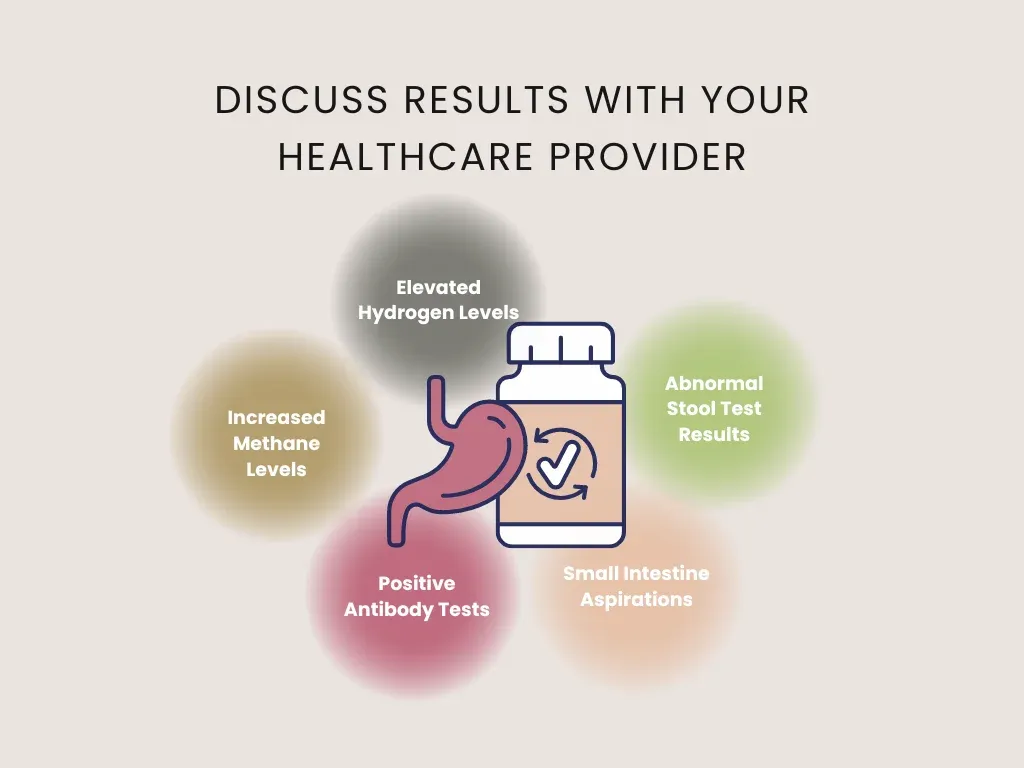
When discussing SIBO symptoms with your doctor, it's crucial to provide a detailed account of your digestive issues, including the frequency and severity of symptoms. Be prepared to describe any factors that worsen or alleviate your symptoms, such as specific foods or activities.
Your doctor may also inquire about your medical history, previous treatments, and any medications you're currently taking to better understand your health status. Communicating any other relevant symptoms or health concerns is essential, as they could be interconnected with SIBO or indicate other underlying conditions.
Being truthful with the needed information helps your doctor easily determine the appropriate diagnostic tests on checking for SIBO. Having an open and honest communication with your healthcare provider further ensures a thorough evaluation and helps tailor the diagnostic process to your individual needs.
Step 2: Take the Appropriate Test
After talking about your symptoms, your physician then performs follow-up testing to confirm if you really have SIBO. They will use appropriate testing on how to check for SIBO and whether your small intestine has gasses or other bacterial markers of bacterial overgrowth. Some of the most commonly used testing methods for checking SIBO include:
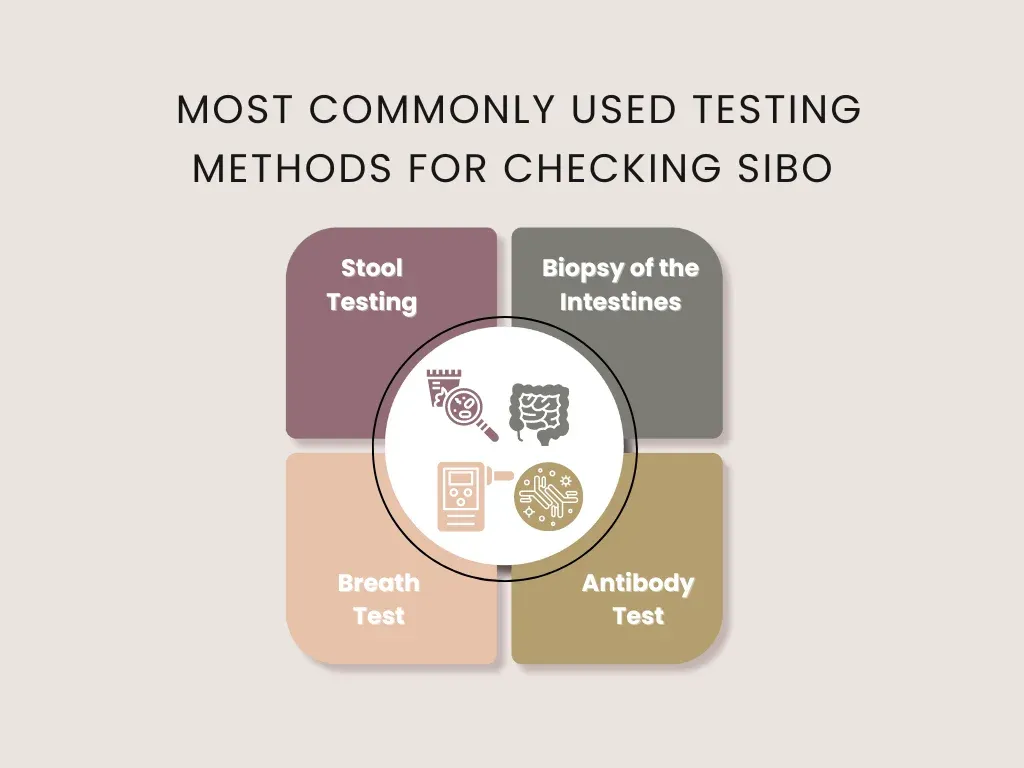
Breath Test
A breath test for SIBO, including the methane breath test, measures your breath's hydrogen and methane levels after taking a sugar solution. The test looks explicitly for elevated methane and hydrogen levels, which then suggests that you have excessive bacteria that create gasses during fermentation.
During a SIBO breath test, your physician will ask you to inhale a sugar solution - either a lactulose or glucose - and exhale it into specially designed collection products at set intervals. You are expected to adhere to pre-test instructions, including fasting before taking the initial breath sample and abstaining from some medications that could impact the glucose breath test results.
The breath test for SIBO is typically used for people who experience bloating, abdominal discomfort, irregular bowel movements, and other symptoms. It's also suitable for patients who have not responded well to standard treatments for gastrointestinal issues.
Stool Testing
This test on how to check for SIBO involves the analysis of a stool sample in the small intestine. Such tests look for elevated levels associated with a bacterial species or its byproducts in stool. Stool testing also uncovers other gastrointestinal problems like inflammation, malabsorption, or aberrations in the gut flora.
Throughout a SIBO stool test, individuals are asked to take a small amount of their stool with a collection kit. The sample is sent to a lab for analysis for abnormalities that indicate SIBO. Conducting this test is likely appropriate for individuals with a history of gastrointestinal surgeries, chronic inflammatory disorders, or prolonged antibiotic use.
Antibody Test
An antibody test is essential in checking SIBO. It uses specific antibodies that the immune system produces to fight bacterial overgrowth in small intestines. This helps detect antibodies against several bacteria related to SIBO, which are indirect indicators of microbes overgrowth. For an antibody test, blood is drawn out of an arm vein. The sample is then sent to a laboratory for analysis regarding elevated SIBO-specific antibodies.
Once the results are out, it typically suggests an immune response against bacterial overgrowth within the small intestine, supporting a SIBO diagnosis. Patients with a history of autoimmune disorders or immunodeficiency benefit most from this test, as they are more prone to bacterial infections.
Biopsy of the Intestines
A small tissue sample from the small intestine lining is taken for an intestinal biopsy for SIBO. This is done during an endoscopy - a flexible tube fitted with a camera is inserted through the mouth or nose into the small intestine. For an intestinal biopsy, patients might be sedated or anesthetic to minimize discomfort.
The endoscope is guided down the digestive tract, and a unique tool takes the tissue sample. Moderate discomfort or bloating may occur afterward but are generally gone quickly. Doctors may consider an intestinal biopsy for SIBO when other non-invasive tests like breath tests or stool analysis are inconclusive or fail to diagnose precisely.
Additionally, they find this test particularly useful when suspecting underlying conditions such as celiac disease, inflammatory bowel disease (IBD), or microscopic colitis that may mimic SIBO symptoms.
Step 3: Discuss Results
After undergoing SIBO testing, discussing the results with your healthcare provider to understand their implications is crucial. Understanding these results guides the development of an effective treatment plan tailored to your condition and symptoms. Here are some typical results and their meanings:
- Elevated Hydrogen Levels: High levels of hydrogen in breath tests often indicate bacterial fermentation of carbohydrates in the small intestine.
- Increased Methane Levels: Elevated methane levels in breath tests can indicate the presence of methane-producing bacteria in the small intestine.
- Positive Antibody Tests: Positive antibody tests in blood may suggest an immune response to bacterial overgrowth, supporting a diagnosis of SIBO.
- Abnormal Stool Test Results: Abnormalities in stool tests, such as increased levels of certain bacteria or markers, can indicate an imbalance in gut flora associated with SIBO.
- Small Intestine Aspirations: Aspirations from the small intestine reveal excessive bacterial growth and confirm the presence of SIBO.
FAQs
The complexity of SIBO can be challenging to diagnose and can lead to misunderstandings about the cause and treatment. Let’s find out these FAQs for effective SIBO management.
1. What specific foods make SIBO worse?
Fermentable carbohydrates in fresh fruits, grains, and vegetables might worsen SIBO symptoms by fueling bacterial overgrowth in your small intestine. A healthcare professional or registered dietitian should be consulted to determine which dietary triggers of SIBO are vital to manage.
2. Is SIBO able to be treated with antibiotics?
Yes! SIBO may be treated with or without antibiotics through diet modifications, herbal therapies, probiotics, and other non-antibiotic treatments. Consult a healthcare provider for the best treatment plan based on your needs and personal preferences.
3. What happens to SIBO if left untreated?
If left untreated, SIBO can lead to persistent digestive symptoms such as bloating, gas, abdominal pain, and diarrhea. Long-term untreated SIBO may contribute to nutrient deficiencies and malabsorption issues and potentially worsen existing gastrointestinal conditions.
Key Takeaway
Understanding how to check for SIBO is crucial for managing digestive health. Healthcare professionals can pinpoint bacterial overgrowth in the small intestine through various diagnostic tests. Symptoms such as bloating, abdominal pain, and gas can be indicative of SIBO and should prompt further investigation.
It's important to consult a healthcare provider for accurate diagnosis and treatment, as self-diagnosis can lead to complications or mismanagement. Early detection and proper management play vital roles in alleviating SIBO-related symptoms.
Diagnosed with SIBO and want some digestive support? Nudge offers a specialized supplement that is designed for SIBO treatment. We offer all-in-one pill solutions to help you deal with your SIBO condition. Learn how Nudge can improve your digestive health by contacting us at contact@nudgehealth.co today.